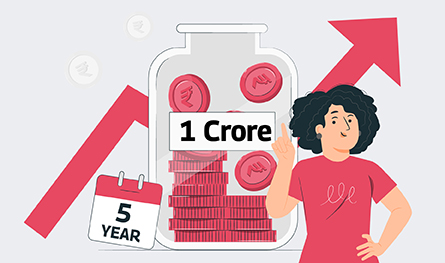Hindu Undivided Family (HUF) Act Advantages, Disadvantages and Features
.png)
Everything you need to know about creating a HUF and its positive or negative impact on income tax.
.png)
In India, the joint family system has long been prevalent and is also fairly appreciated. The unity among the family members, coupled with their keen desire to help one another brings out the beauty of this ageless concept. In line with the joint family, the concept of a Hindu Undivided Family has been introduced. In this blog, we learn all about it and discuss its key features, benefits, and disadvantages to better understand its implications on the income tax payable.
What is Hindu Undivided Family?
A Hindu Undivided Family, better known as HUF, essentially refers to a joint family which is considered as an entity separate from the individuals in the family. To better understand what is HUF, begin by knowing that citizens of India who belong to the Hindu ethnic community may decide to save a considerable amount of tax as a family by forming a Hindu Undivided Family meaning HUF.
In this case, the joint income earned by the family members of the HUF does not levy tax on those specific individuals but is collectively imposed as a whole on all the members of the family. The head of the HUF is the one who runs the family business and is referred to as the ‘Karta’ of the HUF. The family may have some ancestral property as an asset or a piece of property acquired by selling the joint family property. Alternatively, it may be a will, gift, or any property that has been donated commonly by the HUF members.
This asset can be secured from income tax imposition by forming a HUF and making a collective tax payment as a family, rather than paying tax individually by each family member. According to the HUF Act, all the members of a Hindu family are legally entitled to be a part of the HUF. These may include wife, children, as well as their wives and children. All male members of the HUF are referred to as coparceners, while the females are called members. Note that a partition of the HUF is only possible on the demand of a coparcener.
What is a Hindu Undivided Family (HUF) Account?
As mentioned earlier in the blog, members of a Hindu family (particularly those in a family business or owing a joint property/asset) are authorised to come together and create a HUF account with the intention of tax saving. There are some rules, however, to create the HUF account, which are listed below.
8 Key Features of a Hindu Undivided Family (HUF) Account
- Only members of a Hindu family are entitled to create a HUF.
- The HUF comprises a common ancestor and all his descendants, including wives and daughters.
- HUF assets may include ancestral property, will, or gift.
- Every coparcener of the family must agree to the division of the corpus among the family members.
- For every new family member added to the family at the time of marriage, the HUF is automatically created.
- Each family member can deposit his/her earned income into the common corpus pool.
- After the creation of the HUF, a bank account must be created in the name of the family, after which a PAN number is generated in the HUF name.
- Deposits made to the HUF are entitled to tax benefits under various sections of the Income Tax Act.
How to Create a HUF in 3 Simple Steps
A Hindu Undivided Family can easily form a HUF in 3 simple steps, which are listed below for your easy reference:
- Create a HUF deed under the HUF Act
- Apply for a PAN card in the name of the HUF
- Create a bank account in the name of the HUF
The HUF is treated as a legal entity in the eyes of the law once the above steps are duly followed. Deposits can then be made by the HUF members into the account. Also, the amount deposited in the HUF account is not taxable to any individual member of the HUF.
Advantages of Opening a HUF Account
There are some prime benefits to the members of the HUF once they open a common account. Some of these include:
- Gifts received by the family up to a value of Rs. 50,000 is considered free of tax. Also, in case a father with a HUF account gifts a property or money of value higher than 50,000 to his son who owns a smaller HUF account, tax deductions under Sections 64(2) and 56(2) are applicable.
- Section 80C under the ITA lists certain tax deductions for HUF accounts.
- The corpus of a HUF can be used for investment purposes in various tax-free instruments.
- The family head or Karta is authorised to sign all relevant documents on behalf of other members of the HUF.
- HUF account members are entitled to avail of loan facilities.
- They also have the right to make an adopted child a member of the HUF account.
- Family members can create 2 PAN cards and also file tax returns separately.
- HUF is recognised throughout India, barring the state of Kerala.
Disadvantages of the HUF Account
A HUF account has some challenges as well, some of which are listed below:
- Closing the account is much more difficult than opening one. Family partition may be the primary cause for the closure of the account, upon which, the family assets need to be evenly divided among each member of the HUF. This can sometimes be quite a tedious process, even adding to legal hassles on the way.
- Since every family member has equal rights to the family assets, the common family assets or property cannot be sold off without the consent of each member of the HUF. Also, the birth of new members or marriage results in more members being added to the family, further complicating such major decisions.
FAQs on Hindu Undivided Family (HUF) Act
The income tax department can be accessed online by logging on to www.incometax.gov.in
A HUF account can only be created by a family and not just one person. It must comprise a common ancestor and all of his lineal descendants, including wives and unmarried daughters.
Any person born in a HUF gains the legal right over his ancestral property, as per the Hindu Succession Act of 1956.

Author Bio
Paybima Team
Paybima is an Indian insurance aggregator on a mission to make insurance simple for people. Paybima is the Digital arm of the already established and trusted Mahindra Insurance Brokers Ltd., a reputed name in the insurance broking industry with 17 years of experience. Paybima promises you the easy-to-access online platform to buy insurance policies, and also extend their unrelented assistance with all your policy related queries and services.
Other Life Insurance Products
Latest Post
.png)
If you are planning to buy two-wheeler insurance and are seeking answers to some frequently asked questions, look no further. Read on to know the two wheeler insurance FAQs related to bike insurance policy in this post.


Let’s be honest – life insurance planning isn’t exactly someone’s weekend hobby. It is the financial equivalent of flossing: we understand its importance, but we tend to put it off. But somewhere between balancing work and life, you might realise you need to have a solid plan in place – just in case.


If you think of life insurance, chances are you are picturing something people buy in their 30s or 40s. But what if you are 65 or older and just getting started? The good news is that you are never too late. Whether you are thinking of easing the financial burden on your family, covering final expenses, or simply leaving behind a legacy, there are life insurance options tailored just for you.
This article will be a guide to life insurance for senior citizens above 65 years, explaining why it is important, the type of insurance options, and how to get the right policy for you.


Health insurance plans are purchased with the hope of medical protection in times of need. However, sometimes it ends up being a source of surprise and disappointment. This mostly happens when people rush to buy health insurance plans, often overlooking essential aspects. Ignoring waiting period clauses, misunderstanding exclusions, and being unaware of sub-limits can lead to unwanted problems in the future.


If you are looking at investment policies offering INR 1 Crore in 5 years, we talk about some excellent plans in this post to help you choose the best one and reach your goal. However, it is important not to get swayed. Doing proper research and taking advice from financial or insurance advisors is important. Learn about such investment plan in this post.




